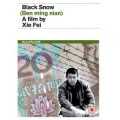| Reviews & Columns |
|
Reviews DVD TV on DVD Blu-ray 4K UHD International DVDs In Theaters Reviews by Studio Video Games Features Collector Series DVDs Easter Egg Database Interviews DVD Talk Radio Feature Articles Columns Anime Talk DVD Savant Horror DVDs The M.O.D. Squad Art House HD Talk Silent DVD
|
DVD Talk Forum |
|
|
| Resources |
|
DVD Price Search Customer Service #'s RCE Info Links |
|
Columns
|
|
|
Black Snow (Ben Ming Nian) -- Second Run UK Import
Second Run // Unrated // March 8, 2010
List Price: £12.99 [Buy now and save at Co]
The Film:
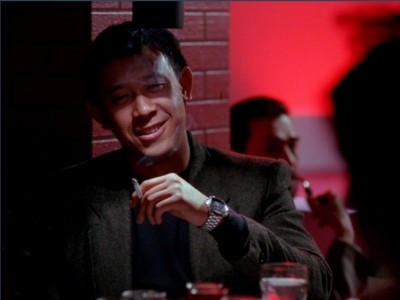 Some time after the collapse of the Cultural Revolution in China, the lead character in Black Snow, Li Huiquan, has been released from a labor camp. He returns home with a knapsack and an underdeveloped education, vowing (non-verbal to us, but obvious) to stray from the life of crime that crippled his youth. Only 24, he hasn't had the chance to life much of a life outside of the loosely-threaded crime syndicate he operated within, never even having a chance to lose his virginity. As he returns to "normal" life, he mans a clothing stand that rides the line between honest work and treading over into the black market, seeing many faces from his past through his everyday routine of peddling shoes, smoking to vast degrees, and holing up after-hours in a colorful music-filled nightclub. With societal stagnancy around every corner, the grasp of criminal activity begins to slowly pull him back into the life he lived before imprisonment.
Some time after the collapse of the Cultural Revolution in China, the lead character in Black Snow, Li Huiquan, has been released from a labor camp. He returns home with a knapsack and an underdeveloped education, vowing (non-verbal to us, but obvious) to stray from the life of crime that crippled his youth. Only 24, he hasn't had the chance to life much of a life outside of the loosely-threaded crime syndicate he operated within, never even having a chance to lose his virginity. As he returns to "normal" life, he mans a clothing stand that rides the line between honest work and treading over into the black market, seeing many faces from his past through his everyday routine of peddling shoes, smoking to vast degrees, and holing up after-hours in a colorful music-filled nightclub. With societal stagnancy around every corner, the grasp of criminal activity begins to slowly pull him back into the life he lived before imprisonment.
Directed by Beijing Film Academy vice president Xie Fei, this "slice of life" piece from 1990 embodies a truthful illustration of post-Cultural Revolution life in Beijing amid the Tiananmen Square protests, while also reflecting on the inadvertent latency of societal rejection. As we watch the wispy smoke swirl around Li Huiquan -- aka Quanzi -- within the lounge where he unwinds, we gather a sense of his disconnect with the world around him. It's only in his interaction with his old "buddies", term used loosely, that he lights up a bit; he tries to obtain a form of forgiveness from a guy he roughed up at a young age, by handing him fistfuls of cash and free clothing, while reluctantly meeting with a sleazy bootlegger trying to rope him back into a life of illegal activity. And, in one of the film's darker, more pointed sequences, Quanzi gets wrapped up in an alcohol-fueled brawl that leads to an act of life-altering violence, something against his well-established reform.
As compelling or emotionally stirring as the premise seems, and as accurate of an essence it ensnares about Quanzi's post-camp reintegration, Black Snow isn't, in itself, an attention-grabbing motion picture. We spent a lot of time staring into Quanzi's eyes as he, by interpretation, reflects on the life he's lost by being imprisoned. He coolly but observably stares at a female lounge singer, listening to the lyrics sang by this innocent-sounding girl -- over and over, which grows tiresome -- while being transported to flashbacks of his childhood. One glimmer of that reflection strikes an expressive chord, yet it's the persistent glances at Quanzi's forlorn smoking that can grow tiresome. Xie Fei incorporates multihued cinematography to give these sequences personality, capturing the late-'80s aesthetic well within off-and-off shots between twilight and daytime, yet they lack the verve needed to distinguish them through the cloud of cigarette smoke.
That's not to say there's a lack of integrity or polish within the director's construction here, as it's clearly a finely-assembled and instinctive depiction of Quanzi's malnourished attempt at re-assimilation. The electric stillness that Xie Fei captures, though latent, grapples a levelheaded property that can be intermittently drawing, mostly due to an astute performance from Jiang Wen as Quanzi. He gives gravity to the character's untutored sulking as he pines for a female lounge singer, without the faculties to properly approach her, and operates on an ambiguous moral level amid his many less-than-upstanding offers. However, unlike the entrenching satisfaction generated in Lee Chang-dong's Peppermint Candy and Alan Parker's Midnight Express, his story of reconciliation tapers off into a strained reiteration of the ideas thrust before us in Black Snow's earliest moments -- all the way to its symbolic, morose close.
The DVD:
Second Run have offered Black Snow in a standard, clear-cased presentation with the company's signature minimalist artwork. Inside, a Booklet contains production credits for this home video presentation, and a lengthy information piece on Xie Fei composed by Shaoyi Sun. Please note that this DVD is region-free but encoded in the PAL format, so makes certain that your television and/or DVD player are capable of displaying this content before purchasing.
Video and Audio:
After recently being surprised by Second Run's presentation of The Valley of the Bees, it doesn't come as much of a surprise that Black Snow looks rather good -- though not nearly as pristine as their effort with the Czech director's '60s-era film. Framed at 1.33:1 and carrying highly accurate color timing, the real flaw that stands out from this transfer comes in the persistent print damage. Speckles, hairline debris, and other signs of a lack of restorative effort clutter the otherwise satisfying picture, while keeping a focused eye on film grain and textural integrity -- jean jacket fabric, wisps of smoke, and brick roughness.
Naturally, the only key elements on the audio side of Black Snow come in dialogue audibility and the musical numbers, which both function well enough for the purpose in this restored Mono. Dialogue's naturally a rough and thin, and doesn't align with the image in a few spots, but it's enunciated and stable to an agreeable degree. A few elements, like the patter of footsteps, actually sound a lot better than expected, while the stream of audio holds a firm, low-distortion stream throughout. What's problematic are the subtitles, not because of the content itself but because of a white bar that appears below the text throughout. It only pops up when subs are on-screen, which essentially means a screen-long bar pops on and off throughout the entire film. Look below for an example:
Special Features:
Typically, Second Run rarely includes anything beyond liner notes in their presentations -- as they have here, including some "random thoughts" on Xie Fei by Shaoyi Sun. However, we've also got a nice addition in the form of an Interview with Xie Fei (31:50, 4x3), where he delves into the history of his life and his filmmaking ventures. It's assuredly a piece that's general enough to likely be included in Second Run's eventual release of the director's first film, A Girl from Hunan.
Final Thoughts:
Though the picture's integrity as a document of a convict's struggle in late-'80s Beijing impresses, along with Jiang Wen's performance as the lead, Xie Fei's Black Snow has a tendency of allowing its brooding smoke-fueled scenes and nightclub songs to linger excessively. In that, the morally-torn material outside of its colorful, moody midsection offers mundane character interaction around an overly familiar premise -- the reformed anti-hero. Second Run's disc serves up a lukewarmly Recommended disc amid a speckled but satisfying image.
Thomas Spurlin, Staff Reviewer -- DVDTalk Reviews | Personal Blog/Site
 Some time after the collapse of the Cultural Revolution in China, the lead character in Black Snow, Li Huiquan, has been released from a labor camp. He returns home with a knapsack and an underdeveloped education, vowing (non-verbal to us, but obvious) to stray from the life of crime that crippled his youth. Only 24, he hasn't had the chance to life much of a life outside of the loosely-threaded crime syndicate he operated within, never even having a chance to lose his virginity. As he returns to "normal" life, he mans a clothing stand that rides the line between honest work and treading over into the black market, seeing many faces from his past through his everyday routine of peddling shoes, smoking to vast degrees, and holing up after-hours in a colorful music-filled nightclub. With societal stagnancy around every corner, the grasp of criminal activity begins to slowly pull him back into the life he lived before imprisonment.
Some time after the collapse of the Cultural Revolution in China, the lead character in Black Snow, Li Huiquan, has been released from a labor camp. He returns home with a knapsack and an underdeveloped education, vowing (non-verbal to us, but obvious) to stray from the life of crime that crippled his youth. Only 24, he hasn't had the chance to life much of a life outside of the loosely-threaded crime syndicate he operated within, never even having a chance to lose his virginity. As he returns to "normal" life, he mans a clothing stand that rides the line between honest work and treading over into the black market, seeing many faces from his past through his everyday routine of peddling shoes, smoking to vast degrees, and holing up after-hours in a colorful music-filled nightclub. With societal stagnancy around every corner, the grasp of criminal activity begins to slowly pull him back into the life he lived before imprisonment. Directed by Beijing Film Academy vice president Xie Fei, this "slice of life" piece from 1990 embodies a truthful illustration of post-Cultural Revolution life in Beijing amid the Tiananmen Square protests, while also reflecting on the inadvertent latency of societal rejection. As we watch the wispy smoke swirl around Li Huiquan -- aka Quanzi -- within the lounge where he unwinds, we gather a sense of his disconnect with the world around him. It's only in his interaction with his old "buddies", term used loosely, that he lights up a bit; he tries to obtain a form of forgiveness from a guy he roughed up at a young age, by handing him fistfuls of cash and free clothing, while reluctantly meeting with a sleazy bootlegger trying to rope him back into a life of illegal activity. And, in one of the film's darker, more pointed sequences, Quanzi gets wrapped up in an alcohol-fueled brawl that leads to an act of life-altering violence, something against his well-established reform.
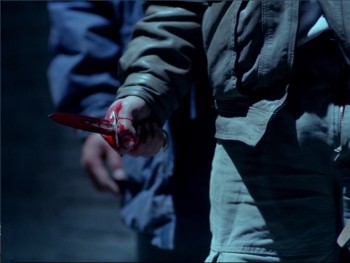 | 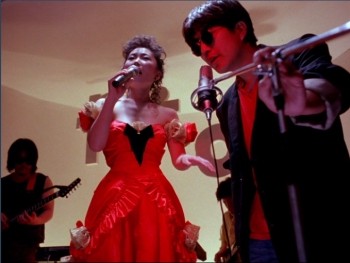 |
As compelling or emotionally stirring as the premise seems, and as accurate of an essence it ensnares about Quanzi's post-camp reintegration, Black Snow isn't, in itself, an attention-grabbing motion picture. We spent a lot of time staring into Quanzi's eyes as he, by interpretation, reflects on the life he's lost by being imprisoned. He coolly but observably stares at a female lounge singer, listening to the lyrics sang by this innocent-sounding girl -- over and over, which grows tiresome -- while being transported to flashbacks of his childhood. One glimmer of that reflection strikes an expressive chord, yet it's the persistent glances at Quanzi's forlorn smoking that can grow tiresome. Xie Fei incorporates multihued cinematography to give these sequences personality, capturing the late-'80s aesthetic well within off-and-off shots between twilight and daytime, yet they lack the verve needed to distinguish them through the cloud of cigarette smoke.
That's not to say there's a lack of integrity or polish within the director's construction here, as it's clearly a finely-assembled and instinctive depiction of Quanzi's malnourished attempt at re-assimilation. The electric stillness that Xie Fei captures, though latent, grapples a levelheaded property that can be intermittently drawing, mostly due to an astute performance from Jiang Wen as Quanzi. He gives gravity to the character's untutored sulking as he pines for a female lounge singer, without the faculties to properly approach her, and operates on an ambiguous moral level amid his many less-than-upstanding offers. However, unlike the entrenching satisfaction generated in Lee Chang-dong's Peppermint Candy and Alan Parker's Midnight Express, his story of reconciliation tapers off into a strained reiteration of the ideas thrust before us in Black Snow's earliest moments -- all the way to its symbolic, morose close.
The DVD:
 | 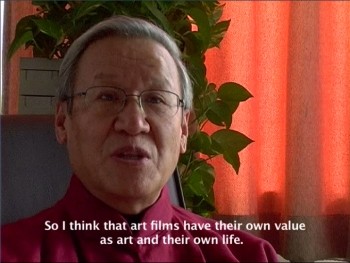 |
Second Run have offered Black Snow in a standard, clear-cased presentation with the company's signature minimalist artwork. Inside, a Booklet contains production credits for this home video presentation, and a lengthy information piece on Xie Fei composed by Shaoyi Sun. Please note that this DVD is region-free but encoded in the PAL format, so makes certain that your television and/or DVD player are capable of displaying this content before purchasing.
Video and Audio:
After recently being surprised by Second Run's presentation of The Valley of the Bees, it doesn't come as much of a surprise that Black Snow looks rather good -- though not nearly as pristine as their effort with the Czech director's '60s-era film. Framed at 1.33:1 and carrying highly accurate color timing, the real flaw that stands out from this transfer comes in the persistent print damage. Speckles, hairline debris, and other signs of a lack of restorative effort clutter the otherwise satisfying picture, while keeping a focused eye on film grain and textural integrity -- jean jacket fabric, wisps of smoke, and brick roughness.
Naturally, the only key elements on the audio side of Black Snow come in dialogue audibility and the musical numbers, which both function well enough for the purpose in this restored Mono. Dialogue's naturally a rough and thin, and doesn't align with the image in a few spots, but it's enunciated and stable to an agreeable degree. A few elements, like the patter of footsteps, actually sound a lot better than expected, while the stream of audio holds a firm, low-distortion stream throughout. What's problematic are the subtitles, not because of the content itself but because of a white bar that appears below the text throughout. It only pops up when subs are on-screen, which essentially means a screen-long bar pops on and off throughout the entire film. Look below for an example:
Special Features:
Typically, Second Run rarely includes anything beyond liner notes in their presentations -- as they have here, including some "random thoughts" on Xie Fei by Shaoyi Sun. However, we've also got a nice addition in the form of an Interview with Xie Fei (31:50, 4x3), where he delves into the history of his life and his filmmaking ventures. It's assuredly a piece that's general enough to likely be included in Second Run's eventual release of the director's first film, A Girl from Hunan.
Final Thoughts:
Though the picture's integrity as a document of a convict's struggle in late-'80s Beijing impresses, along with Jiang Wen's performance as the lead, Xie Fei's Black Snow has a tendency of allowing its brooding smoke-fueled scenes and nightclub songs to linger excessively. In that, the morally-torn material outside of its colorful, moody midsection offers mundane character interaction around an overly familiar premise -- the reformed anti-hero. Second Run's disc serves up a lukewarmly Recommended disc amid a speckled but satisfying image.
|
| Popular Reviews |
| Sponsored Links |
|
|
| Sponsored Links |
|
|
| Release List | Reviews | Shop | Newsletter | Forum | DVD Giveaways | Blu-Ray | Advertise |
|
Copyright 2024 DVDTalk.com All Rights Reserved. Legal Info, Privacy Policy, Terms of Use,
Manage Preferences,
Your Privacy Choices | |||||||









